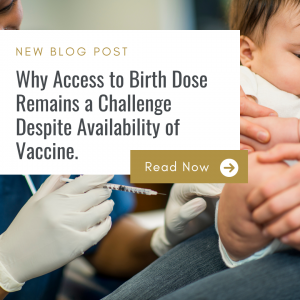
Birth dose is the most critical public health tool to prevent the spread of new hepatitis B infections among newborn children. Vaccination at birth provides lifelong protection against hepatitis B and reduces the chances of developing chronic hepatitis B. However, access to birth dose and vaccinations for children remains a challenge in many countries, especially countries low- and middle-income countries with high prevalence of hepatitis B, despite the availability of safe and effective vaccines.
Lack of Knowledge
Many communities are unaware of the hepatitis B virus and how it can cause severe damage to the liver, especially for newborn children. Mothers who deliver children at home or without appropriate medical care are also less likely to get the birth dose for their babies. Lack of knowledge about the spread of the virus and vaccination persists among some medical providers and professionals as well, making it harder for families to get birth dose for their children in a timely manner. Misconceptions about the virus and the vaccine also makes it difficult to get children vaccinated. Educational campaigns should focus on raising awareness about the hepatitis B virus and teaching communities about the role of the birth dose in preventing serious liver disease and death (Freeland et al., 2023).
Cost and Transportation
Many families mentioned cost to be a barrier to getting the birth dose for their children. For some mothers, they were unable to deliver at health facilities or lacked safe transportation to get to a health facility to get their children vaccinated. For families who lived in rural areas, finding a nearby health facility was a challenge. This also makes it difficult for mothers to return to the health facilities to get the remaining doses for their children.
Lack of Political Will and Advocacy
While the birth dose is available in many countries with high rates of hepatitis B, it is not always accessible to people who need it most. Local governments and health ministries must lead national vaccine advocacy campaigns to spread awareness about the availability and importance of getting children vaccinated at birth to prevent hepatitis B. Additionally, the hepatitis B birth dose should be available to all families at no cost. Vaccine advocacy efforts should focus on debunking myths and misconceptions about the virus and the birth dose.
GAVI, the Vaccine Alliance has launched a new initiative to tackle some of these challenges and expand access to hepatitis B birth dose where it is needed most. Learn more about the new vaccination programme here.
References:
Boisson, A., Goel, V., Yotebieng, M., Parr, J. B., Fried, B., & Thompson, P. (2022). Implementation Approaches for Introducing and Overcoming Barriers to Hepatitis B Birth-Dose Vaccine in sub-Saharan Africa. Global health, science and practice, 10(1), e2100277. https://doi.org/10.9745/GHSP-D-21-00277
Freeland, C., Kanu, F., Mohammed, Y., Nwokoro, U. U., Sandhu, H., Ikwe, H., Uba, B., Asekun, A., Akataobi, C., Adewole, A., Fadahunsi, R., Wisdom, M., Akudo, O. L., Ugbenyo, G., Simple, E., Waziri, N., Vasumu, J. J., Bahuli, A. U., Bashir, S. S., Isa, A., … Tohme, R. A. (2023). Barriers and facilitators to hepatitis B birth dose vaccination: Perspectives from healthcare providers and pregnant women accessing antenatal care in Nigeria. PLOS global public health, 3(6), e0001332. https://doi.org/10.1371/journal.pgph.0001332

